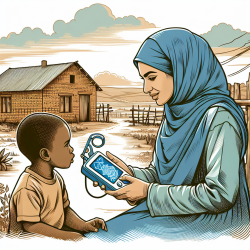As a practitioner working in the field of special education or public health, understanding the environmental factors that influence health outcomes is crucial. The research article "Water Access, Sanitation, and Hygiene Conditions and Health Outcomes among Two Settlement Types in Rural Far North Cameroon" provides valuable insights that can help you improve your practice. This study highlights the importance of water access and sanitation in shaping health outcomes, particularly in rural settings.
The Study's Key Findings
The research conducted in the Far North region of Cameroon examined the relationship between water access, sanitation conditions, and health outcomes among agro-pastoralist villages and transhumant pastoralist camps. Key findings from the study include:
- Fecal Contamination: The study found widespread fecal contamination in both settlement types, with ruminant-associated contamination detected in 81.2% of samples.
- Disease Incidence: A significant difference in diarrheal incidence was noted between camps (31.3%) and villages (0.0%) among young children.
- Pathogen Detection: Salmonella spp. and Shiga toxin-producing E. coli were prevalent across all samples.
- Tetracycline Resistance: This was observed only in village samples, indicating varying levels of antibiotic resistance.
Implementing Research Findings
The findings from this study underscore the critical role of water quality and sanitation in preventing gastrointestinal illnesses. Practitioners can leverage these insights to enhance their skills by:
- Promoting Hygiene Education: Implementing hygiene education campaigns can significantly reduce diarrheal illness risk. Encourage handwashing with soap as a fundamental practice.
- Advocating for Improved Water Sources: Support initiatives that provide access to improved drinking water sources such as boreholes or protected springs.
- Cultural Sensitivity: Understand the cultural practices of different communities to tailor interventions effectively.
- Pursuing Further Research: Engage in or support further research to explore additional host-specific fecal markers and antibiotic resistance genes.
The Path Forward
This study highlights the need for continued efforts to improve water access and sanitation conditions in rural areas. Practitioners can play a pivotal role by advocating for policy changes, supporting community education programs, and collaborating with local authorities to implement sustainable solutions.
The implications of this research extend beyond Cameroon, offering valuable lessons for similar rural settings worldwide. By applying these insights, practitioners can contribute to reducing gastrointestinal illnesses and improving overall community health.










